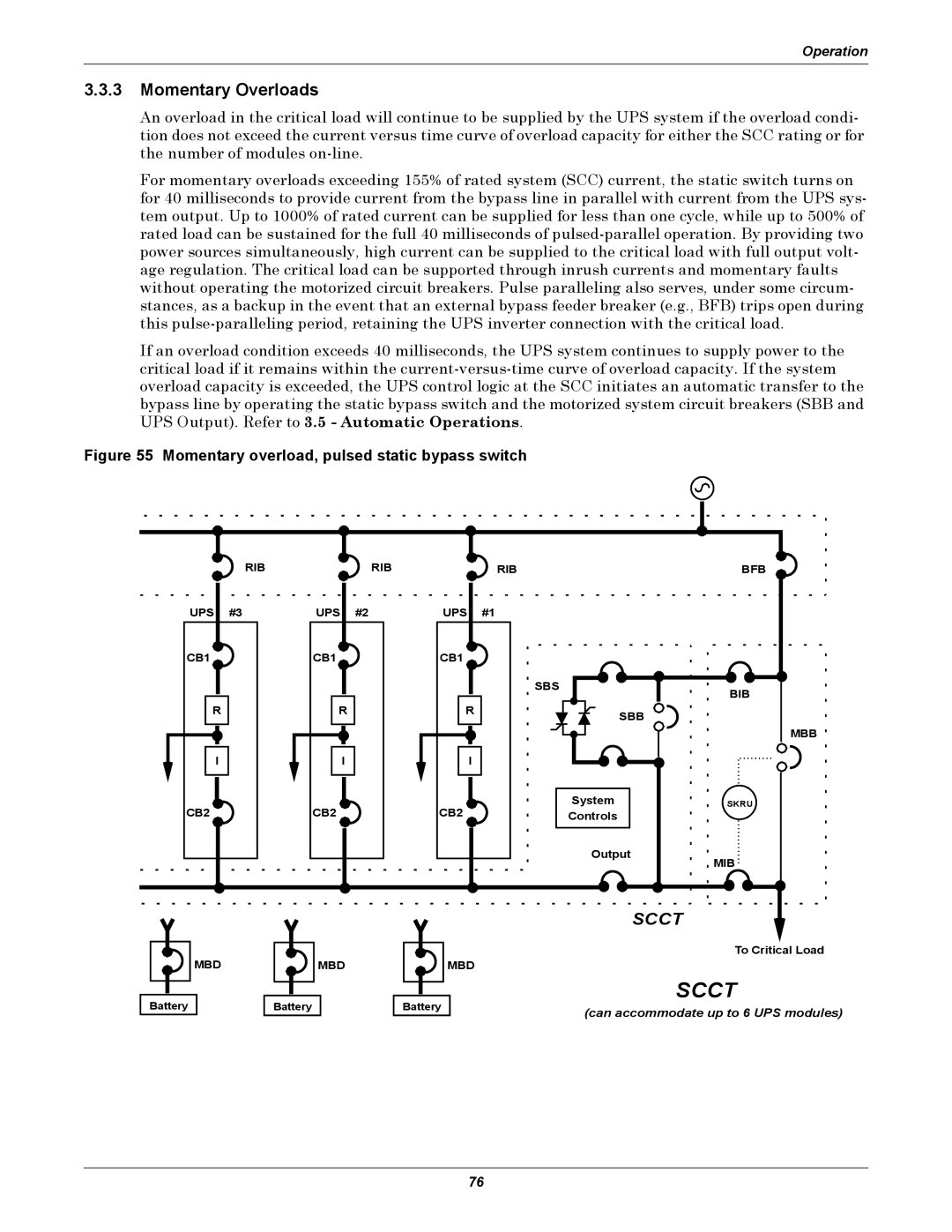
Operation
3.3.3Momentary Overloads
An overload in the critical load will continue to be supplied by the UPS system if the overload condi- tion does not exceed the current versus time curve of overload capacity for either the SCC rating or for the number of modules
For momentary overloads exceeding 155% of rated system (SCC) current, the static switch turns on for 40 milliseconds to provide current from the bypass line in parallel with current from the UPS sys- tem output. Up to 1000% of rated current can be supplied for less than one cycle, while up to 500% of rated load can be sustained for the full 40 milliseconds of
If an overload condition exceeds 40 milliseconds, the UPS system continues to supply power to the critical load if it remains within the
Figure 55 Momentary overload, pulsed static bypass switch
|
|
|
| RIB |
|
|
|
| RIB |
|
| RIB |
|
|
|
| BFB |
|
| ||||
|
|
|
|
|
|
|
|
|
|
|
|
|
|
|
|
|
|
|
| ||||
|
|
|
|
|
|
|
|
|
|
|
|
|
|
|
|
|
|
|
|
|
|
|
|
UPS #3 | UPS #2 | UPS | #1 |
|
|
|
|
|
|
|
|
|
|
| |||||||||
|
|
|
|
|
|
|
|
|
|
|
|
|
|
| |||||||||
CB1 |
|
| CB1 |
|
| CB1 |
|
|
|
|
|
|
|
|
|
|
|
|
| ||||
|
|
|
|
|
|
|
|
|
|
|
| SBS |
|
|
|
|
|
|
|
|
|
|
|
|
|
|
|
|
|
|
|
|
|
|
|
|
|
|
|
|
|
|
|
|
|
| |
|
|
|
|
|
|
|
|
|
|
|
|
|
|
|
|
|
|
|
|
|
|
| |
|
|
|
|
|
|
|
|
|
|
|
|
|
|
|
|
| BIB | ||||||
|
|
|
|
|
|
|
|
|
|
|
|
|
|
|
|
|
| ||||||
|
| R |
|
| R |
| R |
|
| SBB |
|
|
|
|
|
|
|
| |||||
|
|
|
|
|
|
|
|
|
|
|
|
|
|
|
| ||||||||
|
| I |
|
| I |
| I |
|
|
|
|
|
|
|
|
|
|
| MBB | ||||
|
|
|
|
|
|
|
|
|
|
|
|
|
|
|
| ||||||||
|
|
|
|
|
|
|
|
|
|
|
|
|
|
|
|
| |||||||
|
|
|
|
|
|
|
|
|
|
|
|
|
|
|
|
| |||||||
|
|
|
|
|
|
|
|
|
|
|
|
|
|
|
|
|
|
|
|
|
|
|
|
CB2 |
|
|
| CB2 |
|
|
| CB2 |
| System |
|
|
|
| SKRU | ||||||||
|
|
|
|
|
|
|
|
|
|
| |||||||||||||
|
|
|
|
|
|
| Controls |
|
|
|
|
|
|
|
|
|
| ||||||
|
|
|
|
|
|
|
|
|
|
|
|
|
|
|
|
|
|
|
|
|
|
|
|
Output
![]() MIB
MIB ![]()
|
|
|
|
|
|
|
|
| SCCT | |
|
| MBD |
|
|
|
|
|
| To Critical Load | |
|
|
|
|
|
|
|
| |||
|
|
|
| MBD |
|
|
| MBD | ||
|
|
|
|
|
|
|
|
| SCCT | |
Battery |
|
|
|
|
|
| ||||
Battery | Battery | |||||||||
(can accommodate up to 6 UPS modules) | ||||||||||
|
|
|
|
|
|
|
|
| ||
76
